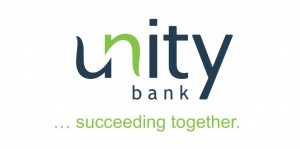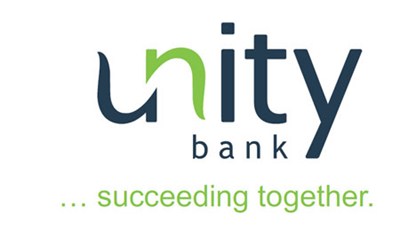Bank
Unity Bank Posts N27B Gross Earnings in H1’22 Records 23% Growth in PAT
Unity Bank Posts N27B Gross Earnings in H1’22 Records 23% Growth in PAT
Retail lender, Unity Bank Plc has posted gross earnings of N27.6 billion for its 2022 half-year results, representing a growth of 17% year-on-year.
In its unaudited half-year financials submitted to the Nigeria Exchange Group Limited, the Bank also made significant improvements across key performance indicators.
The Bank grew Profit Before Tax (PBT) by 23% which rose to N1.8 billion from N1.5 billion in the corresponding period of 2021. Profit After Tax (PAT) for the period equally increased by 23% to close at N1.6 billion from N1.382 billion in H1’21.
The key highlights of the financial statements showed growth in interest and similar income, which rose 18% to N23.938 billion from N20.273 billion in the corresponding period of 2021, an indication of sustained growth in the loan book as well as improved earnings from the lender’s robust digital channels, arising from sustained investment in its digital payment infrastructure.
Similarly, the lender posted sustained asset growth as total assets moved up by 7% to N574.3 billion from N538.9 billion in 2021.
Other key highlights of the financial statement include a 12% growth in deposits, which rose to N359.5 billion from N322.3 billion in December 2021, a clear indication of the positive trend of the Bank’s innovative retail products targeting several segments of the retail market as well as enhanced customer acquisition strategies for emerging products rolled out to the market during the period under review.
In the same vain, the lender recorded an increase on its loan books to N303.632 billion from N269.270 billion in 2021, representing a 13% growth.
Commenting on the financial statements, the Managing Director/CEO of Unity Bank Plc, Mrs Tomi Somefun welcomed the H1’22 results. She noted that while the key performance indicators continue on an upward trajectory; PBT (23% YoY), Total Assets (7% YoY) and gross earnings (17% YoY); the outlook for our financial position has now moderated significantly looking at other fees and income lines which performance was hitherto characterised by volatilities in the operating environment.
“As the Bank aims to further grow all indices to double-digit regions in the coming years, one reassuring take from the financial position lies in the market confidence, as well as steadily growing retail and SME franchise arising from the development of products that resonate with different markets segments, which will enable the Bank to continue to operate and successfully navigate the tough operating environment, amid rising economic headwinds,” Mrs Somefun stated.
The Unity Bank boss also stated that having invested massively in technology to drive a major revamp in our digital Banking products and channels including the Unifi Mobile App, our USSD, *7799#, internet banking, etc., the major focus is to drive increased optimisation which will enable the Bank to provide electronic convenience in the way we support our teaming customers and market segments and more often change the way they transact business.
In the view of analysts, the key performance indicators showed that the market sentiments are responding positively to the strategies of the lender’s management to accelerate the growth momentum designed for the Bank.
Bank
Alpha Morgan to Host 19th Economic Review Webinar

Alpha Morgan to Host 19th Economic Review Webinar
In an economy shaped by constant shifts, the edge often belongs to those with the right information.
On Wednesday, February 25, 2026, Alpha Morgan Bank will host the 19th edition of its Economic Review Webinar, a high-level thought leadership session designed to equip businesses, investors, and individuals with timely financial and economic insight.
The session, which will hold live on Zoom at 10:00am WAT and will feature economist Bismarck Rewane, who will examine the key signals influencing Nigeria’s economic direction in 2026, including policy trends, market movements, and global developments shaping the local landscape.
With a consistent track record of delivering clarity in uncertain times, the Alpha Morgan Economic Review continues to provide practical context for decision-making in a dynamic environment.
Registration for the 19th Alpha Morgan Economic Review is free and can be completed via https://bit.ly/registeramerseries19
It is a bi-monthly platform that is open to the public and is held virtually.
Visit www.alphamorganbank to know more.
Bank
Separating Fact from Confusion: What Nigerians Need to Know About the 7.5% VAT on Banking Service Fees

In recent weeks, digital-banking customers and social media, especially on Twitter have raised concerns about deductions labelled as “VAT” on transfers and other charges.
Some dangerously false narratives, which when you take a critical look, you’ll clearly see that they have been orchestrated and sponsored by malicious elements, have given the impression that the 7.5% Value Added Tax (VAT) is a new or arbitrary charge introduced by fintechs, or that it applies to the amounts customers send. These claims are misleading and deserve careful clarification which is the purpose of this piece.
First, it’s important to understand how VAT works in Nigeria’s financial sector today. VAT on fees and charges for financial services has long been part of Nigeria’s tax system. The then Federal Inland Revenue Service (FIRS) had issued information circulars on March 31, 2021 where it stated that VAT on Financial Services (Circular No. 2021/04) that most fees, commissions, and charges by financial institutions (banks, insurance companies, brokers) are subject to 7.5% VAT.
This justifies a recent advertorial the Nigeria Revenue Service (NRS) which stated unequivocally that VAT was not newly introduced on banking service charges by recent tax reforms, and that it did not impose a new tax obligation on customers in that regard.
However what was left unsaid in that publication was that on the 12th of December, the tax agency had written to all financial institutions and payment gateways based on past meetings with operators that following from the new Tax Act, they were reminded of their mandatory obligations to collect, deduct and remit VAT at the prescribed rate.
The Agency then gave an 18- day grace period to all players to configure and align their systems while directing full compliance with the directive with effect from January 19, 2026. And so, some fintechs sent messages to their customers in the spirit of clarity and transparency.
It must be said that what has changed is that in a bid to widen the tax net, microfinance banks and fintechs who were not obligated to deduct and remit said VAT before now, have now become compelled to do so. The enforcement and standardised collection of VAT across banks and fintech platforms including mobile transfers, USSD transaction fees, and card issuance fees with compliance deadlines issued by tax authorities. So why anyone would vilify any financial institution obeying the laws of the land beats my imagination.
For those who have raised questions around transparency and wrongly suggesting that fintechs are suddenly imposing new, unexplained costs on users – as it has been explained above, this is a matter of regulatory compliance, not a lack of transparency or customer exploitation. These VAT deductions are not new fees created by the companies themselves, and providers are not arbitrarily raising their prices.
In closing, two things that everyone must bear in mind as we move forward in this new tax climate – all stakeholders including fintech platforms and regulators must communicate better and clearly. Nigerians must refrain from peddling unsubstantiated claims and malicious narratives, it has no benefits for anyone and erodes trust in systems.
Bank
FirstBank Introduces Exclusive 500-Seater Bleacher at Carnival Calabar & Festival 2025

FirstBank Introduces Exclusive 500-Seater Bleacher at Carnival Calabar & Festival 2025
Lagos, 26 December 2025 – FirstBank, West Africa’s premier financial institution and financial inclusion services provider, has officially announced its sponsorship of the Carnival Calabar & Festival 2025, unveiling a landmark addition set to redefine the carnival experience — the first-ever private premium seating area at the event.
The highlight of FirstBank’s participation is the construction of a 500-seater premium bleacher, designed to provide comfort, safety, and an elevated viewing experience for carnival enthusiasts.
Speaking on the sponsorship, the Acting Group Head Marketing and Corporate Communications, FirstBank, Olayinka Ijabiyi, noted that the carnival aligns with the Bank’s First@Arts initiative, a platform dedicated to supporting the creative arts value chain across Nigeria. He said, “We recognise the transformative power of the arts, including carnivals, in inspiring people and strengthening national unity. For more than 131 years, we have supported platforms that promote self-expression, social reflection and cultural exchange. Our investment in the Carnival Calabar & Festival demonstrates our commitment to preserving the nation’s rich cultural heritage through First@Arts.”
“As part of our sponsorship this year, we are introducing the first-ever private 500-seater premium bleacher to further elevate the carnival experience. This exclusive seating is designed to provide exceptional comfort and an unforgettable viewing experience for attendees,” Ijabiyi added.
The Chairman of the Cross River State Carnival Calabar Commission, Gabe Onah, also commented on FirstBank’s sponsorship. “FirstBank’s involvement is a strong demonstration of private-sector support for culture and tourism. This partnership not only enhances the overall quality of the carnival but also strengthens its global appeal,” he said.
The Carnival Calabar & Festival 2025 is officially marketed by Okhma Global Limited, the appointed Official Marketer responsible for brand partnerships, promotional engagements, and ticket sales. Okhma Global Limited has partnered with the Cross River State government in delivering Carnival Calabar & Festival for over ten years, playing a key role in strengthening the carnival’s commercial growth and global visibility.
-

 celebrity radar - gossips6 months ago
celebrity radar - gossips6 months agoWhy Babangida’s Hilltop Home Became Nigeria’s Political “Mecca”
-

 society6 months ago
society6 months agoPower is a Loan, Not a Possession: The Sacred Duty of Planting People
-

 society5 months ago
society5 months agoReligion: Africa’s Oldest Weapon of Enslavement and the Forgotten Truth
-

 news6 months ago
news6 months agoTHE APPOINTMENT OF WASIU AYINDE BY THE FEDERAL GOVERNMENT AS AN AMBASSADOR SOUNDS EMBARRASSING





